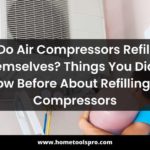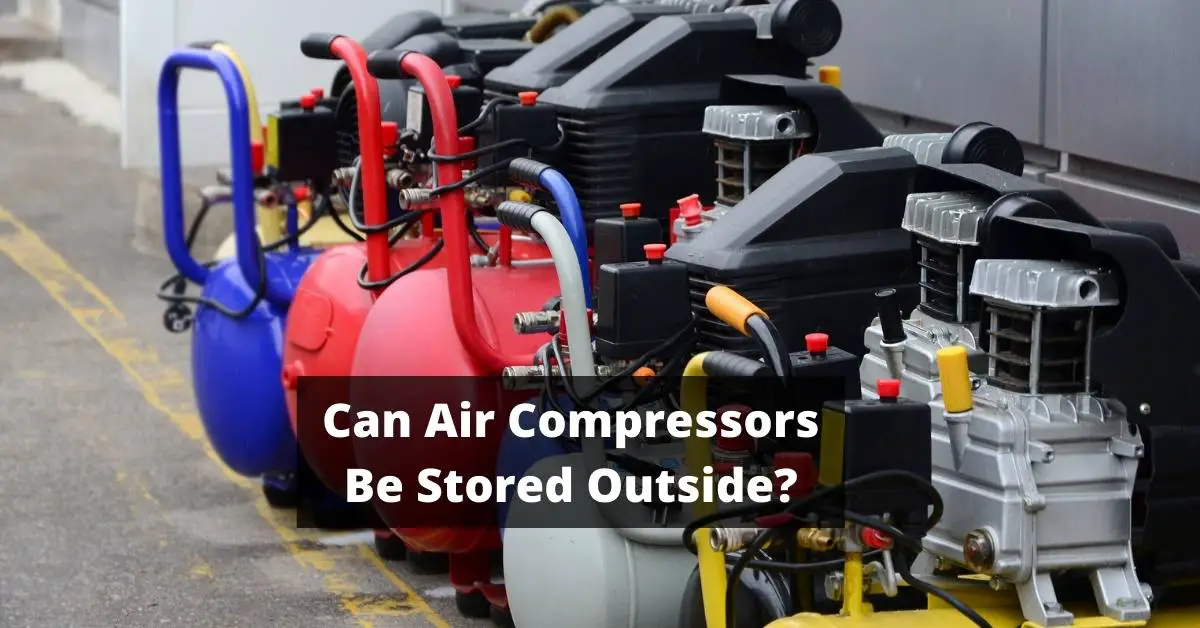Do an Air Compressor Die?
Just like any other machine, air compressors have a lifespan.
With proper maintenance, an air compressor can last for many years.
However, there will come a time when it will eventually die.
There are several reasons why an air compressor would die.
The most common reason is because of wear and tear.
Over time, the air compressor parts will start to wear out.
This is especially true for the moving parts such as the piston and cylinder.
Another reason why an air compressor would die is because of corrosion.
If the air compressor is not properly maintained, rust and corrosion can build up and damage the parts.
So, do air compressors really die? Yes, they do.
But with proper maintenance, you can extend the life of your air compressor and keep it running for many years.
How Long do Air Compressors Last?

This is a question that gets asked a lot, and unfortunately, there is no straightforward answer.
The lifespan of an air compressor depends on a number of factors, including how often it is used, what it is used for, and how well it is maintained.
In general, however, you can expect an air compressor to last anywhere from 5 to 10 years.
If you use your air compressor regularly and take good care of it, it may even last longer than that.
To get the most out of your air compressor and make sure it lasts as long as possible, be sure to follow the manufacturer’s recommended maintenance schedule.
This will help ensure that your air compressor stays in good working condition and doesn’t run into any major problems down the road.
How to Dispose an Air Compressor That Has Died?
When an air compressor dies, it is important to dispose of it properly. You should never throw it in the trash.
Air compressors contain many harmful chemicals and oils that can be very dangerous to the environment.
You can either recycle your air compressor or take it to a hazardous waste disposal facility.
Is ‘Brand New’ or ‘Used’ an Effective Factor For an Air Compressor to Die?

In general, the life expectancy of an air compressor is quite long. With proper maintenance, most units can last over 10 years without issues.
However, a few factors can shorten the lifespan of your unit – one of which is whether it is brand new or used.
If you purchase a brand new air compressor, you can expect it to last for many years with proper care.
However, if you buy a used air compressor, it may only last for a year or two before needing to be replaced.
This is because used compressors may not have been properly maintained and may have already undergone a lot of wear and tear.
So, if you’re looking for an air compressor that will last for many years, it’s best to buy a brand new unit.
However, if you’re on a budget, a used compressor may be a good option as long as you’re willing to replace it sooner rather than later.
What Can Cause an Air Compressor to Die?

Overloading:
Another common cause of air compressor failure is overloading.
This happens when you try to run too many tools or appliances at once from your air compressor.
Overloading can cause the motor to overheat and eventually fail.
Unusual Noises:
If your air compressor starts making unusual noises, it could be a sign that something is wrong.
Any grinding, hissing or rattling noises warrant a call to a professional for diagnosis and repair.
Overheating:

One of the most common causes of air compressor failure is overheating.
If your air compressor runs for too long without a break, the motor can overheat and eventually fail.
Be sure to give your air compressor a rest every few hours to avoid this issue.
Low Air Pressure:
If your air compressor isn’t providing enough pressure, it could be a sign that the motor is failing.
This is often caused by overheating, so be sure to give your air compressor regular breaks.
Lubricant & Air Leaking:
If you notice lubricant or air leaking from your air compressor, it’s a sign that something is wrong.
This could be a simple issue like a loose fitting, or it could be something more serious.
Either way, it’s best to have a professional take a look.
Unusual Vibration:
If your air compressor starts vibrating unusually, it’s a sign that something is wrong.
This could be caused by an unbalanced load, so be sure to check that all your tools and appliances are evenly distributed.
If the vibration persists, call a professional for diagnosis and repair.
How to Repair an Air Compressor?

Pressure Switch/Gauge:
The pressure switch is responsible for turning the motor on and off.
If your compressor doesn’t seem to be getting enough power or is not shutting off when it should, then the pressure switch may not be working correctly.
Check the wiring to make sure it’s all connected properly, and then test the switch itself to see if it’s faulty.
Inlet Filter:
The inlet filter is responsible for keeping dirt and debris out of the compressor.
If your compressor isn’t working properly, then it’s possible that the inlet filter is dirty or clogged.
Clean or replace the filter as needed.
Cylinder with Piston:
The cylinder and piston are responsible for compressing the air.
If your compressor isn’t generating enough pressure, then it’s possible that the cylinder or piston is damaged.
Inspect both components for any damage, and replace them if necessary.
Tank:

The tank stores compressed air.
If your compressor isn’t building up enough pressure, then it’s possible that the tank is leaking.
Inspect the tank for any cracks or holes, and repair or replace it as necessary.
Motor:
The motor powers the compressor.
If your compressor isn’t working at all, then it’s possible that the motor is burnt out.
Inspect the motor for any damage, and replace it if necessary.
If you’re having trouble with your air compressor, then follow these steps to troubleshoot and repair it.
Visual Explanations: https://www.youtube.com/watch?v=oAI4LR6Ha1I
What Are The Best Practices When Using an Air Compressor, That Extends Longevity?
Never Deviate from the Manual:
Read the manual that came with your air compressor before you do anything else.
This will give you a general understanding of how to use and care for your machine.
Keep it Clean:
An air compressor is a machine, and like all machines, it needs to be kept clean.
Dust and dirt can damage the moving parts, so make sure to clean them regularly.
Periodic Cleaning of,
Intake Valve:
The intake valve is what allows air to flow into the compressor.
Over time, this valve can become clogged with dirt and debris.
When this happens, it can restrict the flow of air, which can damage the compressor.
Clean the intake valve every few months to keep it free of debris.
Fuel Tank:
The fuel tank stores the oil that lubricates the compressor.
Over time, this oil can become dirty and needs to be replaced.
Clean the fuel tank every six months to keep it free of dirt and debris.
Keep the Compressor from Corrosion & Rust:
Corrosion and rust can damage the compressor.
To prevent this, make sure to clean the compressor regularly. You can also use a rust inhibitor to protect the machine.
Periodic Nut/Bolt Tightening:
Over time, the nuts and bolts that hold the compressor together with can become loose.
This can cause the machine to vibrate and create noise.
Tighten the nuts and bolts every few months to keep the compressor from vibrating.
Change the Air Filters:

The air filters on the compressor need to be changed regularly.
Depending on the type of compressor, the frequency can vary.
Check the manual for your specific machine.
Check the Lubricant Condition & Level:
The lubricant in the compressor needs to be changed regularly.
Depending on the type of compressor, the frequency can vary.
Check the manual for your specific machine.
Fully Drain the Tank after Every Use:
If you don’t fully drain the tank after every use, water can build up and cause rust.
This will damage the compressor and shorten its lifespan.
Make sure to drain the tank after each use fully.
Inspect the Auto Shut-Off System:
The auto shut-off system is what turns the compressor off when it reaches a certain pressure.
This system needs to be inspected regularly to make sure it’s working properly.
By following these best practices, you can extend the longevity of your air compressor and keep it working properly for years to come.
Visual Explanations: https://www.youtube.com/watch?v=1KGgQl1TYgE&t=14s
How to Protect an Air Compressor From Seasonal Weather Changes?
Freezing Winter Season:
If you live in an area that gets cold in the winter, then it’s important to take steps to protect your air compressor.
The first thing you need to do is drain the tank. Water can build up and freeze, which will damage the compressor.
You also need to make sure that the compressor is stored in a warm, dry place. If it’s stored outside, then make sure to cover it with a tarp or something similar.
Melting Summer Season:
In the hot summer months, your air compressor is susceptible to overheating. Be sure to keep it in a cool, dry place away from direct sunlight.
Inspect the cooling fins on the compressor for a build-up of dirt and dust, which could impede airflow and cause overheating.
Also, check the condenser coils for any build-up of dirt or debris. If either of these is present, clean them off with a brush or compressed air.
Irrespective of the season, it is always best to store the air compressor at an ambient room temperature. You can protect your air compressor from seasonal weather changes by taking these steps.
Related Matters
Do air compressors run out?
No, air compressors don’t run out.
They need to be refilled with air when they get low.
You can either do this yourself with a compressor or take it to a service station and have them do it for you.
What is the most common cause of air compressor failure?
The most common cause of air compressor failure is improper maintenance.
Compressors must be kept clean and free of debris in order to function properly.
Inspections and routine maintenance can help prevent compressor failures.
Another common cause of compressor failure is overheating due to a lack of ventilation.
Compressors should be placed in a well-ventilated area to prevent this from happening.
Why would the air compressor stop work?
There are a few reasons why the air compressor could stop working.
One reason could be that the motor has burned out.
Another reason could be that the compressor is not getting enough power, most likely due to a tripped breaker or a blown a fuse.
Finally, the pressure switch could also be bad and need to be replaced.
Can a compressor runs continuously?
Yes, a compressor can run continuously.
In fact, many compressors are designed to do just that.
The continuous operation provides several benefits, including a steadier output of pressure and more consistent efficiency.
However, running a compressor continuously also puts more wear and tear on the unit, so it’s important to maintain it to ensure long-term reliability properly.
How long do compressor motors last?
The lifespan of a compressor motor can vary depending on the make and model of the compressor and how often it is used.
However, most motors are designed to last for around 8,000-10,000 hours.
Compressor motors can be damaged if they are used in an environment that is too hot or too cold.
Additionally, the motor may wear out faster than expected if the compressor is not properly oiled or maintained.



